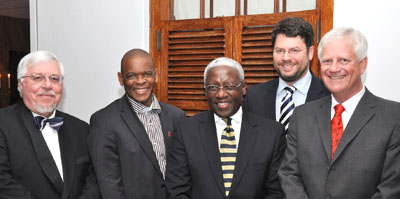Latest News Archive
Please select Category, Year, and then Month to display items
12 January 2024
|
Story Nonsindiswe Qwabe
|
Photo Sonia Small
 Since joining the UFS in 2008, Dr Grey Magaiza has worked extensively on approaches that can foster the socio-economic transformation of societies.
Since joining the UFS in 2008, Dr Grey Magaiza has worked extensively on approaches that can foster the socio-economic transformation of societies.
“The future should be one where communities can decide on their development agenda and futures. That’s the most important for me.” Dr Grey Magaiza, Deputy Director of the Centre for Gender and Africa Studies (CGAS) and Head of the Community Development programme on the Qwaqwa Campus, is passionate about capacitating communities to be agents of change and advancement. His vision for the future emphasises the empowerment of communities to take charge of their development by actively participating in decision making and the implementation of development projects that can improve their lives.
Since joining the UFS in 2008, Dr Magaiza has worked extensively on approaches that can foster the socio-economic transformation of societies. Over the years, he has crafted his research speciality into one that he is most proud of – being an interdisciplinary scientist immersed in the development of communities.
“I’m in a fortunate position of researching what I like. I say ‘fortunate’, because I’ve taken the time to understand what I’m passionate about, which is the overall field of rural livelihoods and livelihood futures – in short, community development. My research starts from an engaged university, understanding the elements that a university must use to enhance transformation and relevance to its immediate community in terms of development.”
One of the ways he has done this is by looking at social entrepreneurship as a development approach for young people in a rural setting. Through workshops with non-profit and civic organisations in Qwaqwa, Dr Magaiza has been helping these organisations to map out their needs and actively meet them through the involvement and support of external role players.
“We understand that communities are part of the national development agenda, but even that national agenda respects community knowledge and intentions and allows communities to shape their identity. A critical enabler of this is community organising. You bring back the capacity in communities to have dialogues on issues affecting them as spaces for engagement, knowledge exchange, and for people to just talk about their way forward.”
By enabling communities to define their development agenda, they can address their specific needs, challenges, and aspirations, he said. “When I look at livelihood futures, it’s quite an exciting aspect of my work – it’s like looking into a fortune tellers’ globe, because you’re not deciding for communities what they should do, but the communities themselves take those decisions.”
UFS informs judicial officers about human trafficking
2010-08-11
 |
At the conference on human trafficking for judicial officers were, from the left: Prof. Johan Henning, Dean of the Faculty of Law at the UFS; Mr Ace Magashule, Premier of the Free State; Chief Justice, Justice S Nqcobo; Mr Andries Nel, Deputy Minister of Justice and Constitutional Development; and Judge Faan Hancke, acting Judge President of the Free State.
Photo: Stephen Collett |
The Faculty of Law’s Centre for Judicial Excellence at the University of the Free State (UFS) in cooperation with the South African Chapter of the International Association of Women Judges (IAWJ) and the Department of Justice and Constitutional Development’s Gender Directorate hosted a conference for judicial officers from the Magistrate’s Courts, the Regional Courts and the High Courts on “Human trafficking: Equal rights, equal opportunities and progress for all”.
The Deputy Minister of Justice and Constitutional Development, Mr Andries Nel delivered a keynote address at this event. He said that anti-human trafficking legislation would be passed in the near future. Also delivering a key note address at the conference was the Chief Justice, Justice Sandile Nqcobo.
The aim of the conference was to empower judicial officers on the topic of human trafficking. A number of presentations from amongst others Adv. Beatri Kruger from the UFS’s Unit for Children’s Rights served to inform magistrates and judges about the characteristics, causes, the human trafficking process and the consequences of human trafficking on victims. Delegates also discussed the impact of human trafficking on human rights and the comprehensive response to human trafficking with a clear focus on the victims’ rights during criminal proceedings.
This conference was attended by 100 judicial officers from across South Africa.